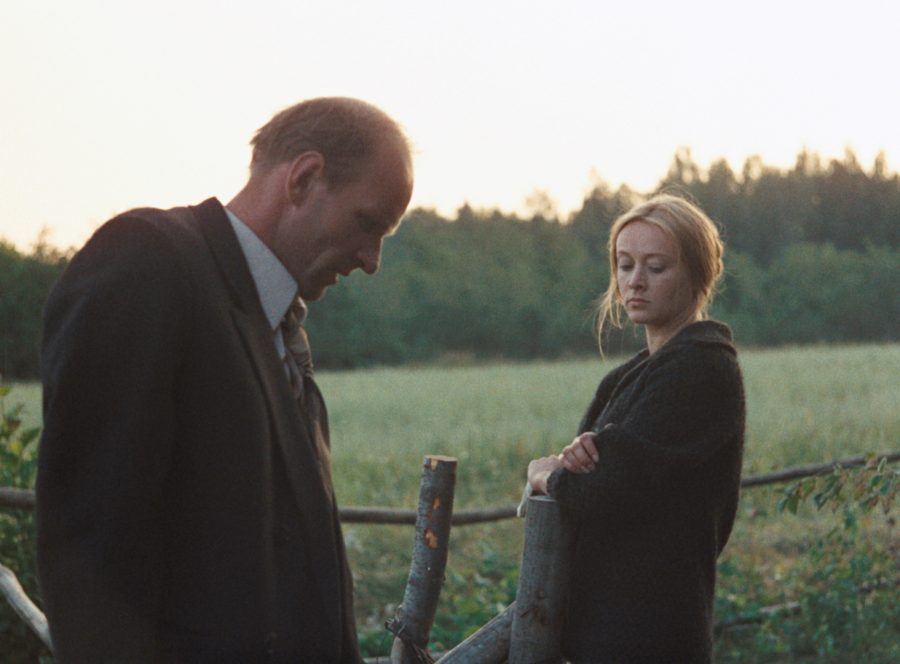The recent restoration of ‘The Mirror’ and the need to resurrect cinematic discourse
Although movie theaters have reopened, film culture remains stagnant. A recent trip to experience Andrei Tarkovsky’s “The Mirror” at Lincoln Center revealed how issues of isolation currently threaten cinematic discourse.
“The Mirror” is a 1975 Russian film directed by Andrei Tarkovsky, following a dying man in his forties as he remembers his past. There is a new restoration of Andrei Tarkovsky’s “The Mirror” at the Lincoln Center. (Photo Courtesy of Cinetic Media)
April 27, 2021
It seems silly to write about Andrei Tarkovsky’s “The Mirror” after so much has been already said about his seminal masterpiece. It seems even sillier attempting to add to the discourse as a sophomoric sophomore in cinema studies who is cognizant of the fact that he’s got nothing new to say; after all, “The Mirror” remains a collection of pretty images backed by an elusive meaning.
But to write about the reintroduction of this cultural artifact as a signifier of the communal film-viewing experience in New York City is something else entirely. After closing in March 2020, Film at Lincoln Center has finally reopened, premiering a new restoration of Tarkovsky’s “The Mirror” that signals cinephilia is headed toward hyper-specificity.
Over the last year, screening venues have had to focus their voices like never before. Anthology Film Archives focused on avant-gardism, Lincoln Center on new voices, Film Forum on Janus restorations and Spectacle on whatever the hell they’re doing. This sentiment can be traced beyond physical venues, as the rise of new and ever-so-niche streaming services like Another Screen (a free feminist streaming service), OvidTV (a new streaming service devoted to global independent cinema) and NoBudge (which focuses on emerging filmmakers) are popping up all over the place. In short, originality was the only way to keep eyeballs focused during the pandemic. As a result, we now have a plethora of unique, albeit disjointed, cinematic entities that pull cinephiles apart as opposed to keeping them together. As more and more cinephiles are pulled into cinematic crannies, they become detached from the overarching culture. As a result, film culture is stretched thin, as if subjected to horse-drawn dismemberment.
We can consider “The Mirror” as the perfect illustration of this scenario. The film is analogous to a quilt, showcasing patched singularities that are related, despite how they appear at first glance. The film presents itself as a long-winded mosaic, arcane and beautiful. Each frame voices an idea, and each scene a sentiment. One of the most straining tasks a viewer can undertake is trying to fit these two pieces together. Connecting the dots is a difficult effort, and as we’ve been secluded for so long, it seems much easier to assume a meaning, internalize it, develop an ideology and keep moving because we’re used to ingesting cinema in a state of isolation.
The isolation engendered by the pandemic has rendered the experience of watching a film into a typical act of self-appeasement. Severed from their community, cinephiles have developed their taste in a vacuum. Now that the potential to reconnect presents itself, they don’t know how to go back to a culture that necessitates the transcendence of the individual. What is lacking is the push to sacrifice autonomy. No one wants to succumb to foreign pressures after manifesting full control over their viewing experience, and as a result, current cinephilia is like an abundance of islands that refuses to acknowledge it’s actually an archipelago.
Looking back on my recent venture to the Lincoln Center, I can report the desire to experience something trumped the desire to talk about said thing. Viewers wanted to experience the visual wonder of “The Mirror” on the big screen and they did. The misfortune here is that the theater is being rendered as yet another screen. The movie theater loses its wonder, as it simply turns into a place where people can view larger images rather than a site to interrogate the images. As a result, film culture remains confined to the cranium, as filmgoers are more concerned with self-gratification than engaging in a communal experience.
As such, there is no conflict, no qualms, no wonders or change, just movies that are projected, digested and buried in brains rather than brought to life via discourse. Watching “The Mirror,” I witnessed filmgoers enter the theater, sit in their little cubicles, and silently go their separate ways once the film ended. No conversations arose. The act of experiencing a film remained solemn and self-indulgent despite the communal setting.
They reacted to nothing and as a result Tarkovsky’s masterpiece became stale. Russian mystics, houses burning, figures floating and explosions elicited nothing. Not a gasp or a sigh, a jolt or a cry. It was then and there that it dawned upon me that going to the movies might never be the same again.
Perhaps it was the product of people having to satiate their own filmic appetites for so long or perhaps any meaning that I purport is too simple to encompass such a radical shift in film culture. But, the fact that the very act of attending a communal screening presented me with a bunch of cinephiles escaping into solitary reflection as opposed to communal delight when the credits to one of the most revered arthouse films ended points to how the pandemic has upturned the conventions of cinematic discourse.
The schismatic breakdown of filmgoing halts discourse by isolating each screening-entity and their subscribers’ voices. This, in turn, renders film culture a collection of individual schools of thought pitted against each other rather than vertices of the same network involved in the act of cultural cross-pollination.
So, how do we move toward unity? Well, the first issue that ought to be addressed is that of accessibility.
As engaging with film becomes hyper-specific, an issue of accessibility arises. By this, I mean that everything that is being curated is too singular, too authoritative, too individually ideological. The current cinematic landscape is the product of in vitro cultivation outside of the organism that is film culture. Current curations across physical and virtual networks are too austere. An element of accessibility ought to be reintroduced to the cinema-going experience to avoid its splintering.
To arrive at accessible cinema, the concept of fun ought to be reinjected into its veins. I do not mean film should pivot in the commercial direction, but rather the opposite. Now that there is a heightened interest in niche cinema, its properties should be treated as blockbusters rather than intimidating samples of insular film cultures. In short, “The Mirror” at Lincoln Center should not be a solemn experience, it should be a bombastic one.
We stand at a point in time where we can refashion the film landscape by clamoring for what we want to experience. In order to do so, good cinema ought to be expressed as such via its consummeristic reception. Filmgoers should not only pay for good cinema, but they should chant: I WANT POETIC CINEMA, I WANT MORE FREE ACCESS, GIVE ME MORE FEMINIST WONDERS, SHOW ME SOMETHING WEIRD!
Cinema requires resuscitation via conversation. The idea that cinema remains alive so long as we keep consuming it in a vacuum is ridiculous because it renders the art inert. It renders it a commodity.
As schools of thought have begun to develop through specific subscriptions and varying cinematic purveyors, it’s now a matter of forcing said schools to interact with one another. Dialogue promotes movement, and if film seeks to remain moving, cinephiles cannot remain cloistered.
We cannot remain aloof or we shall revert to a world where the same narrative conventions and lack of representation dominate the box office due to the audience’s silence. The opportunity to upend the titles on the marquee exists, and it’s just a matter of doing it loudly. Now is the time to have people’s heads resurface and spout. We find ourselves silent, but as Tarkovsky so eloquently professes at the start of “The Mirror,” “Go ahead, say loudly and clearly: I can speak!” Cause a ruckus, as it is only through demolition that new foundations can be set.
Contact Nico Pedrero-Setzer at [email protected]




























































































































































